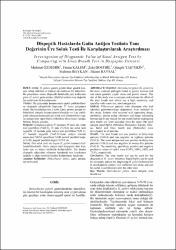Dispeptik hastalarda gaita antijen testinin tanı değerinin üre soluk testi ile karşılaştırılarak araştırılması
Abstract
Amaç: H. pylori, gastrit, peptik ülser, gastrik kansere sebep olabilen ve midede sık rastlanan bir bakteridir. Bu çalışmanın amacı dispeptik hastalarda yeni kullanıma giren H. pylori gaita antijen (HpSA) testinin tanı değerini üre soluk testi ile kıyaslamaktır.
Yöntem: Bu çalışmada hastanemizin çeşitli polikliniklerine dispeptik şikayetlerle başvuran 57 hasta çalışmaya alındı. Bu hastalardan son 1 hafta içinde proton pompa inhibitörleri, antiasit, bizmut içeren bileşikler ve 1 ay antibiyotik almayan hastalarda üre soluk testi (Heliprobe) ve gaita antijen testi rapid HpSA (Meridian Bioscience Europe, Milano, İtalya) çalışıldı.
Bulgular: Çalışmaya alınan 57 hastanın 39’unda üre soluk testi pozitifken (%68.4), 18 inde (%31.6) üre soluk testi negatifti. 32 hastada gaita antijen testi pozitifken (%56.1), 25 hastada negatifti (%43.9).Gaita antijen testinin sensivitesi %82.0, spesifitesi %100, pozitif prediktif değeri %100, negatif prediktif değeri %72.0 idi.
Sonuç: Üre soluk testi tek başına H. pylori tanısında kullanılabilmektedir. Gaita antijen testi dispepsisi olan kişilerde tanı ve tedavi takibinde kullanılabilir. Tek başına dispeptik şikayetleri olmayan hastalarda tanı koydurucu değildir ve diğer testlerle beraber kullanılması faydalıdır. Objective: Helicobacter pylori (H. pylori) is the most common pathogen found in gastric mucosa and can cause gastritis, peptic ulcus and gastric cancer. The aim of this study was to compare and evaluate the effect of the urea breath test which has a high sensitivity and specifity with a new test; stool antigen test.
Method: Fifty-seven patients with dispepsia who had admitted gastroenterology department were included in this study. Patients who received acid supressing drugs, antibiotics, proton pump inhibitors and drugs containing bizmut due to any reason for one month before undergoing urea breath test were excluded from the study. Hp stool antigen rapid HpSA (Meridian Bioscience Europe, Mila¬no, Italy) and Urea breath test (Heliprobe) were investigated in all patients.
Results: The urea breath test was positive in thirty-nine patients (%68.4) and was negative in eighteen patients (%31.6). The stool antigen test was positive in thirty-two patients (%56.1) and was negative in twenty-five patients (%43.9). The sensitivity, specificity, positive and negative predictive values of HpSA were 82.0%, 100%, 100% and 72.0%, respectively.
Conclusion: The urea breath test can be used for the diagnosis of H. pylori infection. Rapid HpSA can be used for dyspeptic patient for diagnosing H. pylori infection but in nondyspeptic patient isn’t sufficient test alone and can be useful in combination with the other tests.
Source
Afyon Kocatepe Üniversitesi, Kocatepe Tıp DergisiVolume
8Issue
2Collections
- Makaleler [452]



















